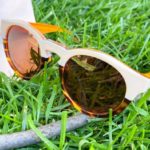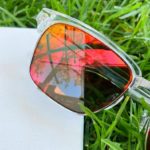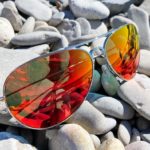Wearing sunglasses in the summer when the sun is at its brightest makes sense. But did you know you should wear sunglasses in the winter too? Even on overcast days? That’s right. You need to protect your eyes with sunglasses 365 days a year.
U.V. Rays
The sun emits U.V. rays all of the time, even when it’s cloudy. U.V. rays are a type of radiation. They’re strongest on a clear summer day but also around on a dreary wintry day. We’ve known for many years that U.V. rays cause damage to the skin, which can lead to premature aging and even cancer. That’s why it’s so important to wear sunscreen during outdoor activities. Now we’re learning that U.V. rays have the same harmful effect on the eyes.
Eye Damage
Every part of the eye is susceptible to damage from U.V. rays. Macular degeneration, cataracts, and damage to the cornea can all result from too much sun exposure. Cancer in and around the eyes is another risk. U.V. rays can also damage the eyelids and lead to wrinkles and even dry eye syndrome. A pair of sunglasses with U.V. protection can help prevent adverse effects from sun exposure.
Snow Blindness
In the winter, snow blindness is another way U.V. rays damage the eyes. All that beautiful white snow and shiny ice act like a mirror, reflecting sunlight and U.V. rays back into your eyes. This can give your eyes a sunburn which leads to temporary snow blindness. Symptoms of snow blindness include sensitivity to light, burning eyes, a gritty feeling in the eyes, halos around lights, and blurry vision. It can last up to a week, but long-term could lead to permanent vision loss. UV-blocking sunglasses can prevent snow blindness.
Glare
Glare is another problem that’s common in winter. The sun’s low angle at that time of year makes glare worse. Sun glare is dangerous because it can prevent you from being able to see. The National Highway Traffic Safety Administration says about 9,000 car accidents a year result from drivers blinded by the glare. Glare is also dangerous on ski slopes and can lead to serious injury. Polarized sunglasses reduce the effects of glare, helping you see clearly in any situation.
Wind
The wind picks up in the winter, especially in Northern Michigan near Lake Michigan. The cold winter wind dries your eyes out quickly. Contact lens wearers especially need to protect their eyes from drying out. Wind can also blow dirt and other debris into your eyes. Sunglasses block the wind and keep eyes comfortable.
Distorted Vision
Sunglasses will also help you see better in general in the winter months. Light-reflecting off the snow, glare, the lower angle of the sun, and wind cause you to squint. It can also cause your eyes to water. That means you can’t see clearly, which can lead to accidents. Squinting can also cause eye strain and headaches. The right pair of sunglasses will ensure you have a healthy, clear view in the winter.
If you want to ensure your eyes are comfortable and protected this winter, stop by the Sunglass Shoppe, and we’ll help you find the right sunglasses to fit your personality and lifestyle.















